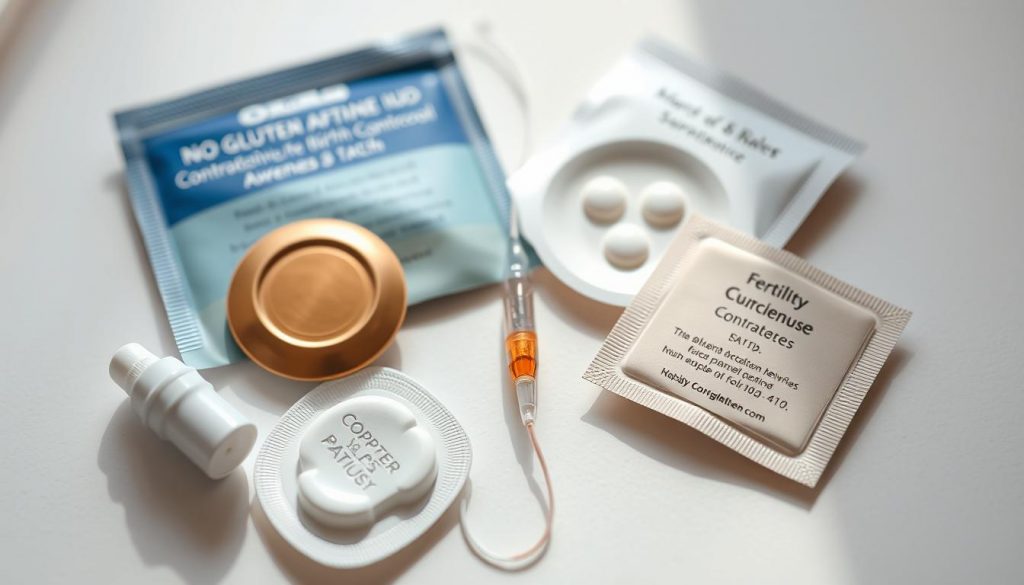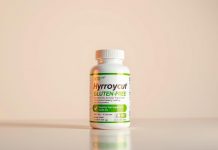Are you thinking about a gluten-free birth control pill to help with gluten intolerance? It’s important to know how it can improve your health. A gluten-free diet is good for those with autoimmunity. Studies from 2009 to 2014 found it can lead to weight loss and better health in non-celiac people1.
You can choose a gluten-free birth control pill or contraception for a healthier life.
Table of Contents
Key Takeaways
- Gluten can make autoimmune diseases worse by increasing intestinal permeability1.
- A gluten-free diet can help women with autoimmune thyroid disease, showing real benefits1.
- Oral contraceptives might raise blood clot risk by 1.5 to 6 to 7 times, based on the pill’s ingredients2.
- Gluten-free birth control pills are a good choice for those with gluten sensitivity or intolerance, supporting a healthier reproductive system.
- Always talk to your healthcare provider to find the right gluten-free birth control for you.
- A gluten-free diet can also ease endometriosis symptoms, with 75% of people seeing less pain after a year1.
Understanding Gluten in Medications
When looking for non-gluten birth control, knowing about gluten in meds is key. Gluten is a protein in some grains. It can be a problem for those with gluten sensitivity or intolerance. The FDA says a gluten-free pill can have up to 0.5 mg of gluten if it has wheat impurities3.
People with gluten issues might need gluten-sensitive contraceptives. The need for gluten-free products is growing. About 1.4% of people worldwide have celiac disease, as shown by blood tests4. This shows how gluten affects health.
Some important facts about gluten in meds are:
- Generic meds can have different ingredients than brand-name ones, affecting gluten levels3.
- Excipients in meds can be from gluten-free sources like corn, potato, rice, or tapioca. Or they might be from wheat3.
- Gluten-free non-oral birth control options include the Depo-Provera® shot, Nexplanon® implant, and IUDs3.
Knowing the risks of gluten in meds helps protect health. Choosing gluten-free options, like non-gluten birth control, is important4. Always talk to a healthcare provider to find the best choice for you.
The Importance of Gluten-Free Options
For those with gluten intolerance or sensitivity, choosing the right birth control is key. Gluten intolerance birth control options are vital for those who react badly to gluten. A gluten-free diet can ease symptoms and support a healthier reproductive system5.
Gluten-free family planning is important for managing gluten intake while planning a family. This ensures that individuals can use birth control without worrying about gluten.
A gluten-free birth control pill is a great choice for those with gluten sensitivity or intolerance. It does not contain gluten, making it safe for those who need to avoid it. This pill can help manage symptoms and support reproductive health6.
Research shows that a gluten-free diet can also help with hormonal issues and endometriosis symptoms5.
https://www.youtube.com/watch?v=nE-tKdlQq20
Gluten-free birth control options are also gaining popularity. About 20% of people actively seek out gluten-free foods5. As demand grows, more options become available, helping individuals prioritize their health and wellbeing.
Types of Gluten-Free Birth Control Pills
There are many gluten-friendly birth control options. You can pick from hormonal and non-hormonal pills. Hormonal pills, like Lo Loestrin Fe, use synthetic hormones to control ovulation7. Non-hormonal pills, on the other hand, stop sperm from reaching the egg.
Lo Loestrin Fe is a low-dose estrogen pill. It has ethinyl estradiol and norethindrone acetate7. These pills are very effective, with a failure rate under 1.0% if used perfectly8. But, if users miss pills, the failure rate is less than 3.0% per year8.
Some pills, like YAZ, have a different pattern. They have 24 active hormone tablets and 4 inactive ones9. Studies show they are over 99% effective when used correctly9. But, they can cause irregular periods or bleeding, and increase blood clot risk9.
| Birth Control Method | Failure Rate |
|---|---|
| Oral Contraceptives | Less than 1.0% per year |
| IUD | 3% |
| Depo-Provera | 0.3% |
Popular Gluten-Free Birth Control Brands
Several popular brands offer gluten-free options for hormone contraception. These brands help those with gluten sensitivity or intolerance manage their reproductive health. Brands like NuvaRing, Yaz, and Yasmin provide gluten-free birth control pill options10. The FDA says a drug can have up to 0.5 mg of gluten per pill3.
It’s important to check if each product is gluten-free. You can look at the label or ask your healthcare provider. Also, non-oral methods like the Depo-Provera shot and Nexplanon implant are gluten-free3.
Here are some popular gluten-free birth control brands:
- NuvaRing: a vaginal ring that releases hormones to prevent pregnancy
- Yaz and Yasmin: gluten-free birth control pills that contain drospirenone and ethinyl estradiol
- Other recognized brands: such as NEXTSTELLIS, which contains estetrol (E4) and drospirenone10

Always talk to your healthcare provider before starting new birth control, if you have gluten sensitivity or intolerance. They can help find the best option for you. This ensures you’re using a gluten-free hormone contraception method that meets your needs.
| Brand | Product | Gluten-Free Status |
|---|---|---|
| NuvaRing | Vaginal ring | Gluten-free |
| Yaz and Yasmin | Birth control pills | Gluten-free |
| NEXTSTELLIS | Birth control pill | Gluten-free |
How to Confirm Gluten-Free Status
Choosing a gluten-free birth control pill is key. About 1 percent of Americans have celiac disease, an immune reaction to gluten11. Always check the label and talk to your doctor to stay safe.
For those with gluten sensitivity or intolerance, finding a gluten-free contraception is vital. Some medications, like blood pressure drugs and Advil, may have gluten12. But, many prescription drugs are now gluten-free. Websites like www.glutenfreedrugs.com can help find gluten-free drugs12.
Here are some tips to help you decide:
- Always read the label carefully to check for gluten-containing ingredients.
- Consult with your healthcare provider or pharmacist to discuss your options and ensure the chosen medication is gluten-free.
- Look for certifications like the Gluten-Free Certification Organization (GFCO) or the Celiac Support Association (CSA) to ensure the product meets gluten-free standards.
By following these steps, you can protect your health. You can choose a gluten-free birth control pill that fits your needs13.
| Medication | Gluten-Free Status |
|---|---|
| NuvaRing | Gluten-free |
| Yaz and Yasmin | Gluten-free |
Side Effects of Birth Control Pills
When looking into non-gluten birth control, knowing the side effects is key. Gluten sensitive contraceptives can ease symptoms for those with gluten issues. Studies show that 4% to 25% of women on hormonal birth control might get constipated14. About 2% to 10% might get diarrhea14.
Following a gluten-free diet can help with hormonal health. Some studies show it can also help with endometriosis symptoms15. It’s important to talk to your doctor about non-gluten options to avoid making gluten sensitivity worse. Common side effects include nausea, headaches, and mood swings. If you have gluten sensitivity, it’s vital to discuss your options with your healthcare provider.
Some important things to talk about with your healthcare provider include:
- Understanding the side effects of birth control pills
- Talking about gluten sensitivity and its impact on birth control
- Looking into non-gluten birth control options, like gluten sensitive contraceptives

By knowing the side effects of birth control pills and looking into non-gluten options, you can make better choices for your reproductive health. It’s important to choose gluten-free options to avoid making gluten sensitivity worse.
Discussing Birth Control with Your Doctor
Talking to your doctor about birth control is key, more so if you have gluten intolerance or want to plan a family without gluten. Before your visit, look into different birth control types, focusing on gluten-free ones. This research will help you make a smart choice about your reproductive health16.
Some important questions to ask your doctor are:
- What are the most effective birth control options for someone with gluten intolerance?
- Are there any gluten-free birth control pills available?
- What are the possible side effects of birth control pills, and how might they affect my gluten intolerance7?
Being ready and asking the right questions can lead you to the right birth control. It should fit your needs and help you live a healthy life, including managing gluten intolerance and planning a family without gluten16.
Always talk about your health and any worries with your doctor. This way, you can find the best birth control for you7.
Maintaining a Gluten-Free Lifestyle
When looking into gluten friendly birth control, think about how a gluten-free diet affects your health. Many women with gluten sensitivity find that avoiding gluten helps with hormone issues17. This shows how important a gluten-free diet is for hormonal health.
To live gluten-free, pay attention to what you eat and watch for cross-contamination. Here are some tips for a gluten-free life:
- Read labels carefully to ensure the products you choose are gluten-free
- Avoid eating at restaurants that do not have gluten-free options
- Prepare your own meals using fresh, gluten-free ingredients
It’s also key to know about nutritional gaps in a gluten-free diet. About 2 million Americans have celiac disease18. A gluten-free diet can help manage this. By using resources for gluten-free diets and following these tips, you can stay healthy and balanced while using Celiac-safe birth control.
For more on living gluten-free, talk to a healthcare professional or check out trusted online sites. Always put your health first by making smart choices about food and products.
Patient Experiences with Gluten-Free Pills
Many people have good things to say about gluten-free birth control pills. They often report fewer side effects and better health19. Some say these pills helped with symptoms like bloating and stomach problems.
A study showed that 60-80% of patients got better after a year on a gluten-free diet19. This makes gluten-free birth control pills a good choice for those with gluten issues. Also, many people say they feel less pain during their periods after switching to gluten-free.
If you’re thinking about a gluten-free birth control pill, talk to your doctor first. They can help figure out if it’s right for you. You can also learn from others who have tried these pills. For more info, check out gluten-free diet pills and how well they work20.
When looking into gluten-free birth control pills, remember a few things:
- Always talk to your doctor about the pros and cons.
- It’s key to stick to a gluten-free diet.
- Look into different gluten-free birth control pills and see how well they work.
By doing your research, you can find a gluten-free birth control pill that’s right for you. This can help you stay healthy and feel good19.
Making the Right Choice for You
Choosing the right birth control is important, even more so for those with gluten sensitivity or intolerance. A gluten-free birth control pill can be a big help. It manages hormonal health issues and can also help with symptoms of endometriosis.
Think about what you need and what you prefer. This way, you can find a gluten-free birth control that fits your lifestyle21. There are many gluten-free options, from hormonal pills to non-hormonal ones. You can pick the one that meets your reproductive health goals21.
Remember, the choice is yours. Talk to your healthcare provider about your concerns. Make a choice that helps you live a healthier, gluten-free life22.
FAQ
What is a gluten-free birth control pill?
What are the health benefits of choosing a gluten-free birth control pill?
What are the different types of gluten-free birth control pills available?
Which popular birth control brands offer gluten-free options?
How can I confirm the gluten-free status of a birth control pill?
Can gluten sensitivity affect the side effects of birth control pills?
What should I discuss with my doctor when considering gluten-free birth control options?
What tips can help me maintain a gluten-free lifestyle?
Where can I find testimonials and experiences from others using gluten-free birth control pills?
How can I personalize my birth control experience as someone with gluten sensitivity?
Source Links
- 5 Science-Backed Reasons to go Gluten-free (plus tips on how to get started) – Dr. Christine Maren – https://drchristinemaren.com/5-science-backed-reasons-to-go-gluten-free-plus-tips-on-how-to-get-started/
- What is the Safest form of Birth Control – Dr. Michael Ruscio, DC – https://drruscio.com/what-is-the-safest-form-of-birth-control/
- Finding Gluten-Free Oral Contraceptive Options for Your Patients – Birth Control Pharmacist – https://birthcontrolpharmacist.com/2020/07/07/gluten-free/
- Gluten in Medications: Why Labeling Matters for Patients With Celiac Disease – https://www.drugtopics.com/view/gluten-in-medications-why-labeling-matters-for-patients-with-celiac-disease
- Who values gluten-free? Dietary intake, behaviors, and sociodemographic characteristics of young adults who value gluten-free food – https://pmc.ncbi.nlm.nih.gov/articles/PMC6310144/
- Celiac Disease and Gluten-Free Diets – Carnegie Womens Health – https://carnegiewomenshealth.com/blog/celiac-disease-and-gluten-free-diets/
- Frequently Asked Questions | Lo Loestrin® Fe – https://www.loloestrin.com/lo-loestrin-faqs
- Aviane (Levonorgestrel and Ethinyl Estradiol Tablets): Side Effects, Uses, Dosage, Interactions, Warnings – https://www.rxlist.com/aviane-drug.htm
- PDF – https://www.medsafe.govt.nz/consumers/cmi/y/yaz.pdf
- Get to know NEXTSTELLIS® (DRSP/E4) – https://www.nextstellis.com/
- Medications and Gluten – https://www.fda.gov/drugs/buying-using-medicine-safely/medications-and-gluten
- Gluten in Medication – Carolina Total Wellness – https://carolinatotalwellness.com/blog/index.php/2021/08/29/gluten-in-medication/
- Medication – https://www.coeliac.org.uk/information-and-support/living-gluten-free/the-gluten-free-diet/medication/
- Does Birth Control Affect Bowel Movements? – https://gi.md/resources/articles/does-birth-control-affect-bowel-movements
- Hidden ingredients in majority of medications may be harmful to some people – https://www.nbcnews.com/health/kids-health/why-do-pills-have-gluten-ingredients-medications-may-trigger-allergic-n982876
- PDF – https://www.uchealth.com/wp-content/uploads/2015/08/WC_August_Newsletter_WC_7-15.pdf
- Gluten Sensitivity, Hormones, and Vitamins – Gluten Free Society – https://www.glutenfreesociety.org/gluten-sensitivity-hormones-and-vitamins/?srsltid=AfmBOop6RjFHymfRfXDG_q2GTQQklpVu3_kOp0oE4-N-8Ntd472f1Vmi
- Nutrient intakes of healthy adults on a gluten-free diet – https://commons.emich.edu/cgi/viewcontent.cgi?referer=&httpsredir=1&article=2005&context=theses
- Identifying and improving adherence to the gluten-free diet in people with coeliac disease | Proceedings of the Nutrition Society | Cambridge Core – https://www.cambridge.org/core/journals/proceedings-of-the-nutrition-society/article/identifying-and-improving-adherence-to-the-glutenfree-diet-in-people-with-coeliac-disease/44B08BEE84A0C64A1EBDE89BFAB3E0CB
- Knowledge and understanding of gluten and the gluten-free diet by students at James Madison University – https://commons.lib.jmu.edu/cgi/viewcontent.cgi?article=1164&context=master201019
- Nurx™ Healthcare from Home – https://www.nurx.com/blog/birth-control-for-vegans/?srsltid=AfmBOopKGCULQIBm2T9dx5vZRaxo68yiegsZUckTztuk_WoXnLhtnekX
- 5 Essential Nutrients Commonly Depleted by the Pill – https://www.nutriadvanced.co.uk/news/5-essential-nutrients-commonly-depleted-by-the-pill/












